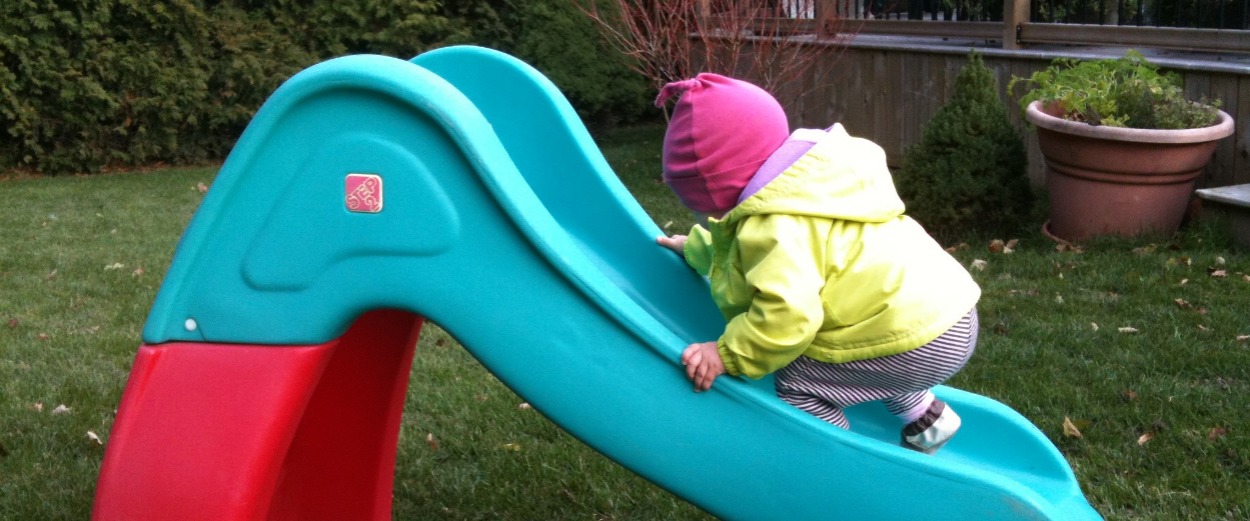By Eileen Dahl
“Go UP the stairs. Slide DOWN the slide. No, Sweetie. Go UP the STAIRS.” She could barely walk, but she was climbing up the slide. Then, and now. Spend ten minutes at a playground, and the appeal of climbing up the face of the slide is undeniable. I am acutely aware of the dangers of falling off the slide, the risks of children bumping into each other. I vaguely remember falling off a slide, decades ago--one of the old, tall ones—before playgrounds had soft surfaces. I like to see everyone going in the same direction. Up the stairs. Down the slide. Nice, orderly, predictable, and safe.
It’s funny, though: the kids on the playground challenge my comfort zone. They see a slippery slope—whether a slide or a patch of ice, as an adventure, as an opportunity to play, fly, defy friction and gravity.
Living with metastatic breast cancer that spread to my bones, for over two years now, I frequently remind myself, “This is a rollercoaster, not a slide.” I remember that I can expect an up and down rhythm to my days, weeks, and months. That I will have days that are good and days that are bad. The pain comes and goes. This is my life. My life is not a slide, one way—down. Then I remember the kids on the playground, and remind myself that even if I do find myself at the bottom of the slide, perhaps I can climb up the way I came down.
A diagnosis of metastatic breast cancer is a tough pill to swallow. Devastating. Metastases to my bones. That explains my months of intermittent, revolving pain. I asked where they were. My family doctor listed a couple of places. And where else? A couple more. He listed six spots and stopped. Later he told me he didn’t have the heart to keep going. When I got the report, there was a full page of findings. I had to Google the names of the bones to figure out where all my metastases were. I have never bothered to count them all.
Sitting in the cancer clinic with my oncologist, time slowed to a near stop. No cure. Disease containment and symptom management. Aha, that means my care is palliative now. Lots of treatment options available. I will be in treatment for life! It’s like a chronic illness now. He’s just trying to make me feel better. People live for years. Radiation right away. Don't lift more than 10 pounds. How do I do that?! Is this permanent or temporary? No, you won’t have chemotherapy now, but we will change your treatment. I can’t pick up my five-year-old. I can’t even lift my cat!
It felt like I was at the top of that slippery slope, and there was nothing to hang on to. What does this mean for me? For my husband and children? Our future?
Before my youngest was born, I had worked as a hospital chaplain/spiritual care practitioner. I worked with people in crisis. Patients and their families who had received devastating news or were facing the end of life. Facing cancer myself, memories of the young women with children that I had cared for came back to haunt and terrify me.
As I grappled with my emotions and fears of dying young, I kept looking at a card on my fridge from Pathways to Resilience III, a conference I had attended earlier in the year. The card was titled Nine Things All Children Need to Be Resilient by Michael Ungar, from his book I Still Love You.
The Nine Things All Children Need to be Resilient are:
- Structure
- Consequences
- Parent-child connections
- Lots and lots of strong relationships
- A powerful identity
- A sense of control
- A sense of belonging, spirituality, culture, and life purpose
- Rights and responsibilities
- Safety and support
I kept going back to the card. My kids will need to be resilient since cancer and treatment will be a part of our lives until I die, and then they will have grief to contend with. It gave me hope to think that I was not helpless. I could help build their resilience by focusing on these nine things. Then I thought, my husband is going to need to be resilient. His future will be challenging too. I can foster resilience for my family now, to help them now AND later!
Finally, I started asking, “how can I be resilient? How might a focus on resilience help me live better now? What can I do to maintain and optimize my health?”
It was like someone scattered sand on my slippery slope. I finally had some traction, a sense of hope, direction, and agency. I reflected on each of the nine resilience factors and wrote about them on my therapy-Instagram account.
I saw a call for abstracts to the Pathways to Resilience IV conference—in Cape Town! I figured, “What do I have to lose?” and submitted a workshop abstract on Resilience while Living with a Life-Threatening Illness. I made a deal with my husband: if it gets accepted, we are taking the kids and going on safari.
It was accepted! Now I needed to create a workshop. I started looking for information about resilience from the metastatic patient’s perspective. There were a few good articles, buried in professional journals that patients were unlikely to ever find. I learned that patients with personal agency, who advocate for themselves and participate fully in their care, tend to do better. Hmm. I want to do everything in my power to do as well as I can!
I had signed up to attend a weekend conference for people living with metastatic breast cancer, and it occurred to me that we were all in the same boat. I needed to ask them what helps them be resilient! I created an online survey, Fostering Personal and Family Resilience in the Midst of Life-Threatening Illness, and invited metastatic breast cancer patients and caregivers to share what helped them cope and thrive. This little survey was expanded to include anyone with metastatic cancer. It’s not a typical research survey; it’s more of a conversation. I am not an independent, impartial, academic researcher. I’m a fellow patient, trying my best to stay well, to cope, and to take care of my family in the midst of living with metastatic cancer.
Here is the survey link: https://www.surveymonkey.com/r/YQXR5Y8
The survey is still available for a little longer. People living with metastatic cancer or caring for someone with metastatic cancer are welcome to participate. There is an opportunity at the end to request the survey results, too.
Since creating the resilience survey, I have also developed a reflection/discussion tool, Resilience Inventory for Patients/Family Caregivers. I speak at conferences to healthcare professionals about my story, resilience, and health. We explore how the resilience of the patient, family, and healthcare professional are linked, and how professionals can help patients and their families be resilient too.
Sometimes the resources we need don’t exist, so we have to create them. I saw gaps in the resources, research, and information available for people with bone metastases, so I created Living With Bone Mets Awareness Week, February 4 to10, 2018. On Facebook there is now a page, Living with Bone Mets, and two closed groups: People Living with Bone Mets and Bone Mets Collaborative.
Two years after my metastatic diagnosis, I am still doing really well. It is not easy, and I’m not always pain-free, but I focus on taking good care of myself by eating well, getting rest, and walking as much as I can. I surround myself with people who love and support me and I find meaningful ways to share the things I’m learning. I am careful about what I do, but by watching me, no one would ever guess that I have health issues, let alone metastatic breast cancer. I am focusing on the things that improve my health, well-being, and quality of life. I am living with metastatic breast cancer, and I am thriving anyway.
Eileen Dahl, from the greater Toronto area, is a registered psychotherapist, certified spiritual care practitioner, speaker, consultant, and an independent resilience researcher. She lives with metastatic breast cancer. She blogs her experience on Instagram @ThriveAnyway and is attempting to create dialogue on Facebook at Thrive Anyway—Resilience and Health.








